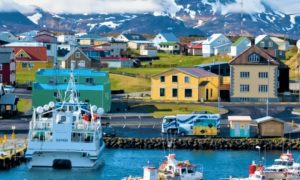Iceland, with its unique natural landscape, high quality of life and excellent public services, is attracting more and more people to settle here. After deciding toimmigrantsBefore Iceland, it is crucial to understand the Icelandic education, health and welfare systems. These systems not only affect you and your family's daily life, but also directly relate to your integration process, quality of life and future development. This article will take an in-depth look at the Icelandic education system, healthcare and social welfare to provide you with theImmigration to IcelandKey information needed before.
I. The Icelandic education system: quality public education and internationalization opportunities
The Icelandic education system is known for its high quality, accessibility and inclusiveness. Public education in Iceland is free and open to all residents, whether they are Icelandic citizens or immigrant families. The following are some important features of the Icelandic education system:
1. pre-school education
Pre-school education in Iceland is available for children between the ages of three and six. Although pre-school education is not compulsory, most families choose to enroll their children in kindergartens. In kindergarten, children not only learn basic life skills, but their creativity and social skills are promoted through play, socialization and hands-on practice. Pre-school education places great emphasis on a child's personality development and emotional education, aiming to lay the foundation for future learning.
2. elementary education
Basic education in Iceland consists of primary and lower secondary school, starting at the age of 6 and usually lasting until the age of 16. Primary education is usually provided by public schools and includes basic subjects such as Icelandic language, mathematics, natural sciences and social studies. In addition, Icelandic schools emphasize the personal growth and mental health of their students, and offer courses to help students cope with difficulties in their studies and in life.
3. Secondary and higher education
Secondary education in Iceland is divided into general high schools (academic programs) and vocational high schools. The general high school program includes more academic studies and prepares students for university, while the vocational high school focuses more on skill development and provides students with certification for technical and vocational qualifications. Icelandic universities, such as the University of Iceland, offer high-quality academic programs. For immigrant students, many programs offer the opportunity to study in English, especially at the graduate level.
4. Universal and inclusive education
Icelandic education focuses on equality, and all children, regardless of their family background, financial situation or language ability, have access to the same educational resources. Even non-Icelandic students receive a good education in Icelandic schools. The Government also provides language learning support to help immigrant students better adapt to the Icelandic education system.
II. The Icelandic health care system: efficient public health protection
The health care system in Iceland is based on public health care, and all residents have access to comprehensive health care. The quality of health care in Iceland is high, with modern medical facilities and excellent doctors and nursing staff. The following are the main features of the Icelandic healthcare system:
1. Universal Health Coverage
Iceland has a system of universal health insurance, and all residents (including immigrants) are required to be covered by national health insurance. This means that all persons legally residing in Iceland have access to free basic health care. Public health insurance covers most medical expenses, including family doctors, hospital treatment, emergency services and long-term care. For some non-emergency medical services, such as dental treatment or certain specific medicines, partial out-of-pocket expenses may be required.
2. Family doctor (GP) system
Every resident in Iceland has a family doctor, called a "GP" (General Practitioner). The family doctor is responsible for providing day-to-day health management, disease prevention and basic treatment. If more specialized treatment or surgery is needed, the family doctor will refer the patient to a specialist or hospital. The family doctor system ensures that residents have access to timely health advice and treatment.

3. Hospitals and Medical Facilities
Iceland's health care system relies on several of its major hospitals, such as the Landspitali University Hospital in Reykjavík. These hospitals are well-equipped and equipped to deal with a wide range of acute and chronic illnesses. Iceland also has a number of regional hospitals and clinics, which ensure that people everywhere have access to basic health care.
4. Medical expenses and insurance
Although most health care is free of charge, Icelandic residents still have to pay a fee for some treatments, medicines and services. In order to reduce the burden on individuals, the Government of Iceland offers residents a health insurance scheme to ensure that medical treatment does not become too expensive.

III. The Icelandic social welfare system: providing comprehensive protection
Iceland has a well-developed social welfare system, which is designed to safeguard the basic needs of the population and provide them with strong social support. The following are some key aspects of the Icelandic welfare system:
1. unemployment insurance
Iceland offers an unemployment insurance system designed to help the unemployed through periods of financial hardship. All eligible residents may apply for unemployment benefits, the amount of which is usually linked to the applicant's work history and salary level. In addition, immigrants are also entitled to unemployment insurance if they have resided in Iceland for more than a certain number of years.
2. pension system
Iceland has a state pension system, and all legal residents are required to participate in social insurance to provide financial security in retirement. The state pension is paid by the government and is combined with private pension schemes, which together ensure the quality of life of the elderly.
3. Childcare and family welfare
Iceland attaches great importance to family and childcare welfare, and the Government provides various types of support for families with children. Immigrant families are entitled to government benefits such as childcare subsidies, maternity leave and parental leave. The parental leave policy in Iceland is very liberal, and parents can take up to 12 months paid parental leave, which can be arranged flexibly by both parents.
4. Housing subsidies and social assistance
The housing market in Iceland is highly competitive, especially in the capital city of Reykjavík. In order to help low-income and immigrant families, the Government provides certain housing subsidies and social assistance to help them solve their housing problems. The conditions for applying for social assistance are relatively relaxed, and eligible families can benefit from the financial assistance provided by the government.
IV. Summary
Iceland's education, healthcare and welfare systems provide immigrants with an excellent livelihood. Whether it is a high quality public education system or comprehensive health care and social welfare, Iceland ensures that residents can live and work in a supportive and secure environment. For programsImmigration to IcelandFor those who do, understanding and making the most of these systems will undoubtedly be the key to successful integration, personal development and family well-being. Before immigrating, it is important to have an in-depth understanding of these systems to help prepare yourself and your family adequately.






